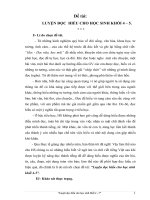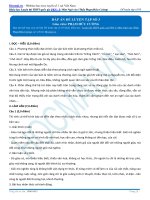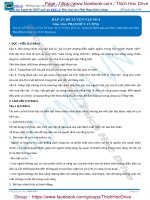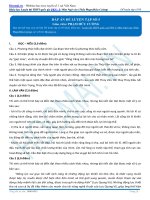TH luyen doc hieu 12
Bạn đang xem bản rút gọn của tài liệu. Xem và tải ngay bản đầy đủ của tài liệu tại đây (131.92 KB, 6 trang )
PASSAGE 12
►Read the following passage and mark the letter A, B, C or D on your answer sheet to
indicate the correct answer to each of the questions from 1 to 10.
Learning means acquiring knowledge or developing the ability to perform new behaviors. It is common
to think of learning as something that takes place in school, but much of human learning occurs outside the
classroom, and people continue to learn throughout their lives.
Even before they enter school, young children learn to walk, to talk, and to use their hands to manipulate
toys, food, and other objects. They use all of their senses to learn about the sights, sounds, tastes, and smells
in their environments. They learn how to interact with their parents, siblings, friends, and other people
important to their world. When they enter school, children learn basic academic subjects such as reading,
writing, and mathematics. They also continue to learn a great deal outside the classroom. They learn which
behaviors are likely to be rewarded and which are likely to be punished. They learn social skills for
interacting with other children. After they finish school, people must learn to adapt to the many major
changes that affect their lives, such as getting married, raising children, and finding and keeping a job.
Because learning continues throughout our lives and affects almost everything we do, the study of
learning is important in many different fields. Teachers need to understand the best ways to educate children.
Psychologists, social workers, criminologists, and other human-service workers need to understand how
certain experiences change people's behaviors. Employers, politicians, and advertisers make use of the
principles of teaming to influence the behavior of workers, voters, and consumers.
Learning is closely related to memory, which is the storage of information in the brain. Psychologists
who study memory are interested in how the brain stores knowledge, where this storage takes place, and how
the brain later retrieves knowledge when we need it. In contrast, psychologists who study learning are more
interested in behavior and how behavior changes as a result of a person's experiences.
There are many forms of learning, ranging from simple to complex. Simple forms of learning involve a
single stimulus. A stimulus is anything perceptible to the senses, such as a sight, sound, smell, touch, or taste.
In a form of learning known as classical conditioning, people learn to associate two stimuli that occur in
sequence, such as lightning followed by thunder. In operant conditioning, people learn by forming an
association between a behavior and its consequences (reward or punishment). People and animals can also
learn by observation - that is, by watching others perform behaviors. More complex forms of learning include
learning languages, concepts, and motor skills.
(Đề thi tuyển sinh đại học năm 2012)
Question 1: According to the pasage, which of the following is learning in broad view comprised of?
A.
Acquisition of social and behavioural skills
B.
Knowledge acquisition and ability development
C.
Acquisition of academic knowledge
D.
Knowledge acquisition outside the classroom
Question 2: According to the passage, what are children NOT usually taught outside the classroom?
A. literacy and calculation
B. life skills
C. interpersonal communication
D.
right from wrong
Question 3: Getting married, raising children, and finding and keeping a job are mentioned in paragraph 2 as
examples of __________.
A.
the situations in which people cannot teach themselves
B.
the areas of learning which affect people's lives
C.
the changes to which people have to orient themselves
D.
the ways people's lives are influenced by education
Question 4: Which of the following can be inferred about the learning process from the passage?
A.
It is more interesting and effective in school than that in life.
B.
It becomes less challenging and complicated when people grow older.
C.
It plays a crucial part in improving the learner's motivation in school.
D.
It takes place more frequently in real life than in academic institutions.
Question 5: According to the passage, the study of learning is important in many fields due to
A.
the great influence of the on-going learning process
B.
the influence of various behaviours in the learning process
C.
the exploration of the best teaching methods
D.
the need for certain experiences in various areas
:
Question 6: It can be inferred from the passage that social workers, employers, and politicians concern
themselves with the study of learning because they need to_____________.
A.
change the behaviours of the objects of their interest towards learning
B.
make the objects of their interest more aware of the importance of learning
C.
understand how a stimulus relates to the senses of the objects of their interest
D.
thoroughly understand the behaviours of the objects of their interest
Question 7: The word "retrieves" in paragraph 4 is closest in meaning to _________.
A. generates
B. recovers
C. creates
D.
gains
Question 8: Which of the following statements is NOT true according to the passage?
A. Psychologists studying memory are concerned with how the stored knowledge is used.
B. Psychologists studying memory are concerned with the brain's storage of knowledge.
C. Psychologists are all interested in memory as much as behaviours.
D. Psychologists studying learning are interested in human behaviours.
Question 9: According to the passage, the stimulus in simple forms of learning ___________.
A. makes associations between behaviours
B. is created by the senses
C. is associated with natural phenomena
D. bears relation to perception
Question 10: The passage mainly discusses __________.
A. simple forms of learning
B. practical examples of learning inside the classroom
C. application of learning principles to formal education
D. general principles of learning
ĐÁP ÁN
PASSAGE 12
Question 1:
According to the passage, which of the followinq is learning in broad view comprised of?
Điều nào sau đây chỉ việc học ở ý tổng quát:
Learning means acquiring knowledge or developing the ability to perform new behaviors.
=> B
Question 2:
According to the passage, what are children NOT usually taught outside the classroom? Điểu gì
học sinh KHƠNG được dạy ngồi lớp học
A.
đọc viết và tính tốn
B.
các kĩ năng cuộc sống
C.
kĩ năng giao tiếp người các cá nhân với nhau
D.
điền đúng từ điền sai
When they enter school, children learn basic academic subjects such as reading, writing, and
mathematics. (khi đến trường, trẻ em học những môn học cơ bản như đọc, viết và tốn học => đây là
những mơn trẻ em khơng được học ngồi lớp học)
=> A
Question 3:
Getting married, raising children, and finding and keeping a job ore mentioned in paragraph 2 as
examples of___________. Kết hôn, ni con, tìm và giữ 1 cơng việc được đề cập như các ví dụ về:
After they finish school, people must learn to adapt to the many major changes that affect their lives,
such as getting married, raising children, and finding and keeping a job. (học cách thích nghi với những
thay đổi cơ bản gây ảnh hưởng đến cuộc sống)
=> C (những thay đổi mà con người phải tự định hướng cho bản thân)
Question 4:
Which of the following can be inferred about the learning process from the passage? Điều nào có
thể dự đốn về q trình học
A.
Học ở trường thú vị và hiệu quả hơn học ở cuộc sống
B.
Khi con người ta trưởng thành hơn, việc học dần trở nên ít thử thách và ít phức tạp
C.
Việc học đóng 1 vai trò quan trọng trong việc cải thiện động lực của người học ở trường
D.
Việc học diễn ra ở đời sống hàng ngày nhiều hơn ở những học viện, trường học.
It is common to think of learning as something that takes place in school, but much of human learning
occurs outside the classroom, and people continue to learn throughout their lives. (hầu hết việc học của con
người đều diễn ra bên ngoài lớp học, và con người phải tiếp tục học trong suốt cuộc đời của họ)
=> D
Question 5:
According to the passage, the study of learning is important in many fields due to ________: Việc học
quan trọng ở rất nhiều lĩnh vực do
A.
sự ảnh hưởng lớn của quá trình học liên tuc
B.
sự ảnh hưởng của nhiều hành vi trong quá trình học
C.
sự khám phá ra những phương pháp dạy tốt nhất
D.
sự cần thiết những kinh nghiệm nhất định trong nhiều lĩnh vực
Thông tin nằm ở câu đầu đoạn 3:
Because leaning continues throughout our lives and affects almost everything we do, the study of
learning is important in many different fields. (việc học tiếp diễn trong suốt cuộc đời và ảnh hưởng đến
hầu hết mọi thứ chúng ta làm)
=> A
Question 6:
It can be inferred from the passage that social workers, employers, and politicians concern
themselves with the study of learning because they need to ___________.
Psychologists, social workers, criminologists, and other human-service workers need to understand
how certain experiences change people's behaviors. (cần hiểu những trải nghiệm nhất định thay đổi
hành vi của con người như thế nào)
Employers, politicians, and advertisers make use of the principles of learning to influence the
behavior of workers, voters, and consumers. (cần tác động đến hành vi của ...)
=> Có thể suy luận rằng những cơng nhân, người thuê nhà; và những chính trị gia quan tâm tới
việc học bởi họ cần hiểu rõ những hành vi của những đối tượng họ quan tâm)
=> D
Question 7:
retrieve (v): to bring or get something back, especially from a place where it should not be - lấy lại,
tìm lại được cái gì (theo từ điển Oxford Learner's Dictionary) = recover (v): phục hồi lấy lại
- generate = create (v): tạo ra, tạo thành
- gain (v): thu được, đạt được cái gì sau cố gắng, nỗ lực
=> B
Questions 8:
Psychologists who study memory are interested in how the brain stores knowledge, where this storage
takes place, and how the brain later retrieves knowledge when we need it. In contrast, psychologists who
study learning are more interested in behavior and how behavior changes as a result of a person's
experiences. (Các nhà tâm lí học nghiên cứu về trí nhớ quan tâm tới việc não bộ lưu trữ tri thức như thế
nào, việc lưu trữ xảy ra ở đâu và não bộ lấy lại tri thức khi cần dùng như thế nào. Đối lập lại, những nhà
tâm lí học nghiên cứu về học tập thì quan tâm nhiều hơn đến hành vi và cách hành vi thay đổi)
=> Khơng phải các nhà tâm lí học đều quan tâm đến cả trí nhớ và hành vi.
=> C
Question 9:
According to the passage, the stimulus in simple forms of learning ___________,
A.
tạo ra sự liên tưởng giữa các hành vi
B.
đươc tạo ra bởi các giác quan
C.
có liên hệ với các hiện tượng thiên nhiên
D.
thể hiện sự liên quan tới sự nhận thức
A stimulus is anything perceptible to the senses, such as a sight, sound, smell, touch, or taste. In a
form of learning known as classical conditioning, people learn to associate two stimuli that occur in
sequence, such as lightning fallowed by thunder. (sự kích thích là cái gì đó có thể nhận thức được bởi các
giác quan... trong điều kiện cơ bản, con người học cách liên hệ 2 tác nhân xảy ra theo trình tự, ví dụ như
sét đi kèm theo sấm)
=> D
Question 10:
Bài viết chủ yếu đề cập đến việc học tập và những nguyên tắc, nguyên lí khái quát của việc học: bao
gốm các ví dụ thực tế về viêc học trong lớp, và học ngoài cuộc sống, việc áp dụng những nguyên lí học tập
vào các lĩnh vực khác nhau, các nhân tố liên quan đến việc học và các hình thức học.
=> D
Vocabulary
- ability to V (n): có khả năng làm gì
- manipulate (v): nắn bóp, thao tác, vận động bằng tay
- interact with smb/ smt (v): tương tác với ai/ cái gì
- academic (adj): mang tính học thuật
- reward (v): thưởng, trao thường
- pshychologist (n): nhà tám lí học
- social worker (n): người làm việc trong các tổ chức dịch vụ xã hội
- crimininologist (n): nhà tội phạm học
- human - service (adj): thuộc về ngành dịch vụ phục vụ con người
- make use of smt (v): tận dụng cái gì
- principle (n): yếu tố cơ bản, nguyên tắc, nguyên lí
- retrieve (v): lấy lại, tìm lại được
- stimulus (n): sự kích thích, tác nhân kích thích/ stimuli (n): (số nhiều)
- perceptible (adj): có thể nhận biết, có thể quan sát thấy
- operant (adj): có hiệu lực, có thể quan sát được, đo được
- concept (n): khái niệm
- motor skill (n): kĩ năng lái xe









